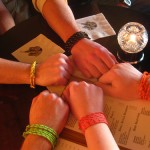Adults need to respect each child’s friendship style and preferences
by Irene S. Levine, Ph.D.
 An article in today’s New York Times challenged the notion that children should have best friends. A Best Friend? You Must Be Kidding by Hilary Stout raised hackles among parents by reporting that several school and camp administrators are trying, in fact, to squelch best friendships. The professionals’ rationale: Kids should be friends with everyone because exclusivity sets the stage for cliques and bullying.
An article in today’s New York Times challenged the notion that children should have best friends. A Best Friend? You Must Be Kidding by Hilary Stout raised hackles among parents by reporting that several school and camp administrators are trying, in fact, to squelch best friendships. The professionals’ rationale: Kids should be friends with everyone because exclusivity sets the stage for cliques and bullying.
The article glossed over the fact that there are differences among people (adults as well as children) in their need for friendships. By dint of personality, some kids are social butterflies and others prefer to spend more time alone, with an intimate best buddy, or with siblings or other family members. While there are strong cultural pressures to encourage children to expand their social circle, adults need to respect each child’s friendship style and preferences.
In my opinion, neither school officials nor parents should be “regulating” friendships. When teachers (or parents) hover too closely or meddle at the first sign of a tiff between kids, children are denied the opportunity to learn friendship lessons they will need as adults. Kids need to be able to choose friends and work out problems as independently as possible— taking into consideration, of course, the child’s age and level of maturity.
Parents serve as role models to their children. They demonstrate how friends can be lifelong sources of joy, sharing, and support. But parents need to be honest, too, in conveying the message to their children that problems invariably crop up in relationships and need to be worked out. They shouldn’t be ashamed to admit that some differences turn out to be irreconcilable, and that most friendships, even very good ones, have expiration dates.
It’s a mistake to make the leap into thinking that close friendships lead to bullying. In fact, when children are bullied or excluded, it is their true friends who “have their backs” and can buffer them from that trauma.







